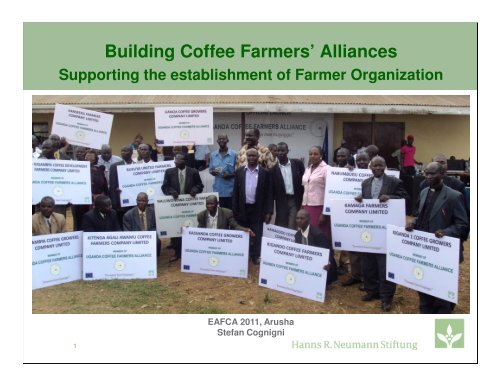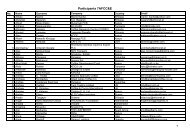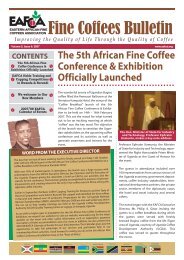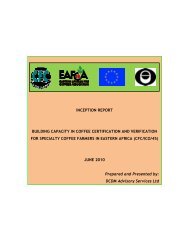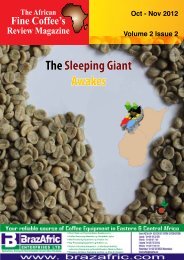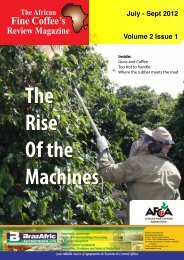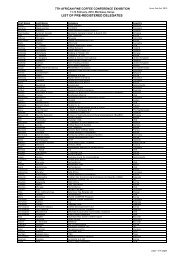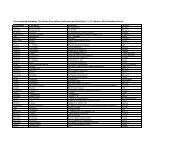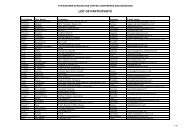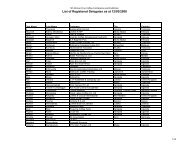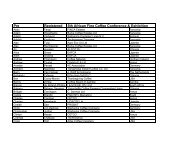(Microsoft PowerPoint - Stefan Cognigni - Building Coffee ... - EAFCA
(Microsoft PowerPoint - Stefan Cognigni - Building Coffee ... - EAFCA
(Microsoft PowerPoint - Stefan Cognigni - Building Coffee ... - EAFCA
Create successful ePaper yourself
Turn your PDF publications into a flip-book with our unique Google optimized e-Paper software.
<strong>Building</strong> <strong>Coffee</strong> Farmers’ Alliances<br />
Supporting the establishment of Farmer Organization<br />
1<br />
<strong>EAFCA</strong> 2011, Arusha<br />
<strong>Stefan</strong> <strong>Cognigni</strong>
1. Quality Issue – green immature coffee dried directly on the ground<br />
2. Why did the farmer pick his coffee green, instead of waiting until fully<br />
mature?<br />
How much did the farmer earn for his green coffee? How much value did he<br />
loose?<br />
2
Main challenges faced by smallholders with<br />
regards to business development and marketing<br />
Knowledge<br />
� Lack of a clear understanding of the value chain<br />
� Lack of market information<br />
� Lack of business, marketing and technical skills<br />
Size<br />
� Individually they are too small to access / attract the important<br />
services that are critical for developing their enterprises<br />
� Low volume of produce results in very weak bargaining position<br />
� Their most likely “business” partners are middlemen. This has<br />
created a very strong dependency on middlemen (market access,<br />
finance, etc.)<br />
3
Objective of the Alliance Model<br />
To create an environment and infrastructure<br />
which enables smallholder farmers to develop<br />
their agricultural potential and to increase<br />
their competitiveness by releasing ownership<br />
of their produce at a much higher value point.<br />
� The development of efficient and transparent<br />
farmer organizations with technical,<br />
managerial and entrepreneurial capacity, has<br />
proven very effective in achieving this.<br />
5
What are the key areas of focus?<br />
� Establishment of Farmer Organizations<br />
� Capacity <strong>Building</strong><br />
�� Business Training<br />
� Technical Training<br />
� Access to Services<br />
� Improved Production<br />
6
Benefits of Organizational Development<br />
� To empower farmers to create economic opportunities<br />
� To provide farmers ownership and decision-making<br />
� To enable market access and participation in the value chain<br />
�� To enhance bargaining power and achievement of economies of scale<br />
� To make smallholders attractive to service providers<br />
� To encourage “farmer to farmer” learning<br />
� To give farmers a voice - to engage in dialogue with other<br />
stakeholders<br />
� To strengthen the self help potential of coffee communities<br />
7
Organizational Development Levels<br />
Producer Depot Committee Uganda <strong>Coffee</strong><br />
Organization (PO) (DC) Farmers Alliance<br />
25 - 35 Farmers Approx. 20 POs Association of DCs<br />
Area Village Level Parish Level National Level<br />
Key Mobilization Coordination of PO activities Coordination of DC activities<br />
Functions Extension Bulking Market access<br />
8<br />
Collection of <strong>Coffee</strong> Value addition Link to service providers<br />
Entry point for new Farmers → <strong>Coffee</strong> logistics → Capacity building<br />
Quality control Strategic partnerships<br />
Marketing Representation<br />
Code of conduct<br />
Key Roles Executive Committee Executive Committee Board of Directors<br />
Lead Farmer Control Committees Executive Manager<br />
Demo Holder Marketing manager Support staff<br />
FFS Host DC Extensionist<br />
FFS Facilitator
Demonstration plots<br />
9<br />
Extension Tools<br />
Farmer Field Schools
Depot Committee establishment steps<br />
� Appointing Control Committees<br />
� Business & Marketing Committee<br />
� Finance Committee<br />
� Disciplinary Committee<br />
10<br />
Approximately 600 farmers per<br />
DC<br />
� Identifying a number (20-25) of<br />
POs that are willing to come<br />
together<br />
�� Electing an executive<br />
committee<br />
� Drafting a constitution<br />
� Setting up an office/store for<br />
administration and collection of<br />
coffee<br />
� Appointing a Marketing<br />
Manager and an Extensionist
11 � Auditing<br />
Depot Committee Training<br />
� Financial management, accounting<br />
and banking<br />
� Election of leaders<br />
� Professional conduct and<br />
good business practices<br />
� Administration -<br />
documentation and record<br />
keeping<br />
� Logistics of bulking and<br />
marketing coffee<br />
� Post harvest coffee<br />
handling and quality<br />
control
Elements for Successful Farmer Organizations<br />
� Committed and respected leadership able to mobilize and influence<br />
community members<br />
� Efficient, transparent and accountable management team, focused<br />
on improving commercial performance and returns to members<br />
�� The above 2 points lead to TRUST (critical)<br />
Other Criteria<br />
� Distance from towns/centers/markets<br />
� Uniformity in terms of enterprises – common issues and problems<br />
� Understanding of members’ marketing behavior and requirements<br />
12
13<br />
Survey on Farmers’ Marketing Behavior<br />
(A) 20%<br />
(B) 55%<br />
Highest Price Payment on Delivery<br />
(C) 10%<br />
Attachment to Traders<br />
(D) 15%<br />
Convenience
How to enhance trust among members<br />
Control Committees<br />
� Business & Marketing Committee<br />
� Finance Committee<br />
�� Disciplinary Committee<br />
• Participate in the development of business and marketing plans<br />
• Carry out a supervisory role to ensure that plans are followed and<br />
that good business practices are employed<br />
14
How to enhance trust among members<br />
Community Participatory Auditing<br />
� To ensure transparency and<br />
accountability<br />
�� To assess the performance<br />
and efficiency of leadership<br />
and management.<br />
� To assess the status of group<br />
assets<br />
Audit results are discussed in<br />
general meetings which are open<br />
for participation by any member<br />
15<br />
Group<br />
D<br />
Group<br />
A<br />
Audit<br />
Team<br />
Group<br />
Group<br />
• Audit team composed of one<br />
member from each group<br />
• Audit team replaced every year<br />
C<br />
B
Achievements in the Mityana/Mubende <strong>Coffee</strong><br />
Farmers Alliance Project (15,000 farmers)<br />
� 24 Depot Committees have been registered as Companies.<br />
� DC Companies carry out primary processing and deliver hulled green<br />
coffee (FAQ) directly to exporters in Kampala.<br />
�� Through this new marketing opportunity farmers have achieved a 23%<br />
higher price for their coffee (net of processing and marketing costs).<br />
� DC Companies have access to marketing loans from financial<br />
institutions. A model for input finance is currently being tested.<br />
� Farmer organizations have implemented a quality control system to<br />
ensure that only good quality coffee will be marketed through the<br />
organizations.<br />
16
17<br />
Quality Control<br />
Testing coffee quality<br />
• Moisture content<br />
• FAQ outturn<br />
• Screen size
Yield Achievements<br />
� Adoption levels of good<br />
agricultural practices have<br />
more than trebled; this has led<br />
to an increase in the average<br />
farmers’ production from about<br />
600 Kg green coffee per Ha to<br />
about 1.3 MT/Ha.<br />
� Average production on demo<br />
plots has reached about 2.7<br />
MT/Ha. Similar production<br />
levels have also been<br />
achieved by some of the most<br />
improved farmers.<br />
18
Uganda <strong>Coffee</strong> Farmers Alliance<br />
Registered in May 2010 – Launched in November 2010<br />
The Uganda <strong>Coffee</strong><br />
Farmers Alliance<br />
(UCFA) is a farmer<br />
owned Apex<br />
Organization. Its role is<br />
to provide marketing<br />
and other support<br />
services to its member<br />
organizations.<br />
19
20<br />
DC Companies delivering hulled<br />
coffee (FAQ) to Kampala
Value Addition for the Farmers<br />
Uganda <strong>Coffee</strong> Farmers Alliance Members – Main Crop 10/11<br />
Buyer FAQ Price<br />
USD/Kg<br />
Dry Cherry<br />
Middlemen<br />
(outside project<br />
area)<br />
Dry Cherry<br />
Middleman (inside<br />
project area)<br />
21<br />
DC<br />
Deduction<br />
USD/Kg<br />
Net FAQ<br />
price for<br />
Farmers<br />
Net price Dry<br />
Cherry*<br />
equivalent<br />
Total Value<br />
Addition<br />
USD/Kg Dry<br />
Cherry<br />
- - - 0.68 0<br />
- - - 0.75 0.07 (10%)<br />
FAQ Trader<br />
Hulling Factory 1.69 0.21 1.48 0.81 0.13 (19%)<br />
Exporter Kampala 1.78 0.25 1.53 0.84 0.16 (23%)<br />
* Dry cherry equivalent at 55% outturn
22<br />
Value of coffee in its different stages<br />
(USD/Kg Dry Cherry equivalent)<br />
Green Cherry<br />
Farm Gate<br />
Red Cherry<br />
Farm Gate<br />
Dry Cherry<br />
Farm Gate<br />
FAQ Hulling<br />
Factory<br />
FAQ<br />
Kampala<br />
Mkt. Value 0.37 0.53 0.75 0.93 0.98<br />
Mkt. Cost - - - 0.12 0.14<br />
Net Value 0.37 0.53 0.75 0.81 0.84<br />
Value Loss 56% 37% 11% 4%
Combined impact of value addition and yield<br />
improvement on net income – 300 coffee trees<br />
Selling point<br />
Production (Kg dry<br />
cherry per tree)<br />
Production Cost (USD<br />
per tree)<br />
Net farmer price<br />
(USD/Kg)<br />
Total Production Cost<br />
(USD)<br />
Non<br />
Member<br />
low yield<br />
Farm<br />
Gate<br />
Alliance<br />
Member<br />
low yield<br />
Farm<br />
Gate<br />
Alliance<br />
Member<br />
low yield<br />
Exporter<br />
Kampala<br />
Alliance<br />
Member<br />
average yield<br />
Exporter<br />
Kampala<br />
Demo Plot<br />
(full GAP)<br />
high yield<br />
Exporter<br />
Kampala<br />
1 1 1 2.2 4.5<br />
0.20 0.20 0.20 0.46 0.78<br />
0.68 0.75 0.84 0.84 0.84<br />
60 60 60 138 234<br />
Total Income (USD) 204 225 252 554 1,134<br />
Net Income (USD) 144 165 192 416 900<br />
% Increase 23 in Income 15% 33% 289% 625%
Adding further value?<br />
� Further improve the performance and efficiency of<br />
farmer organizations to reduce costs and overheads<br />
� Conventional value chain � grading<br />
� Non-conventional value chain � certification<br />
With such a foundation in place, how much more sustainable<br />
would the certification process be, especially if farmer groups<br />
became certificate holders?<br />
24
Final Considerations<br />
� Incremental flow of funds into rural areas<br />
At the current Alliance production levels, if all 15,000 project<br />
farmers sold their coffee through their organization directly to<br />
exporters in Kampala, an additional USD 3 M in income would be<br />
flowing into the project area on an annual basis.<br />
25<br />
This would promote investments in rural areas which would lead<br />
to growth and economic development<br />
Therefore the benefit of organizational development and value<br />
addition goes beyond the direct beneficiaries. The community will<br />
also profit from it.<br />
� Farmer organizations can also focus on other value<br />
chains such as beans, maize, etc.
Thank you for your attention<br />
26


